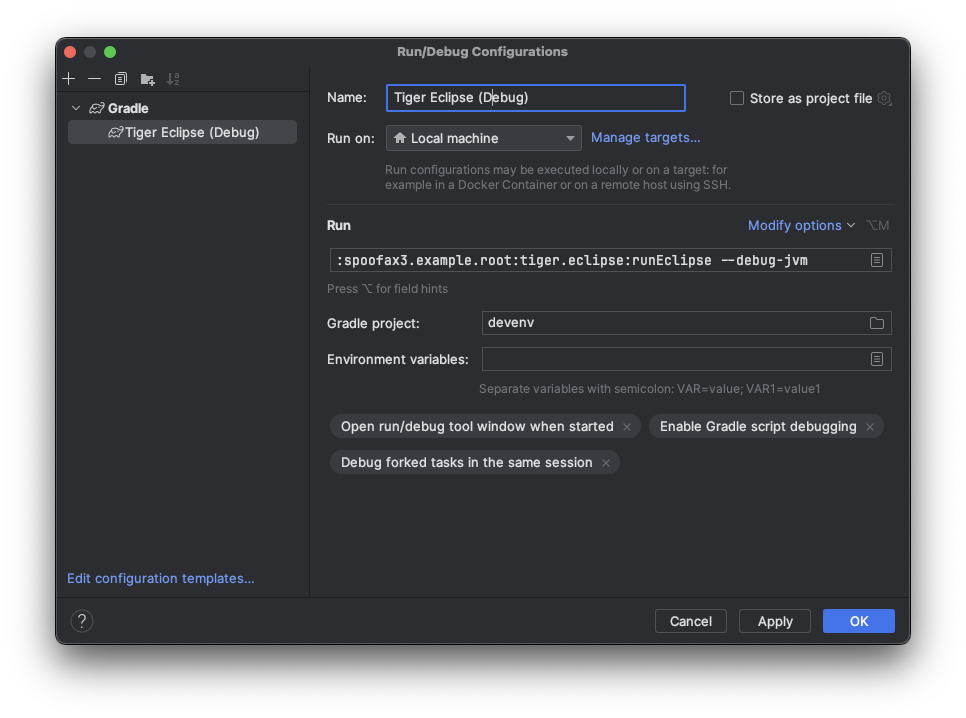How to debug Spoofax 3 development using IntelliJ¶
To debug Spoofax 3 development using IntelliJ, create a new Run Configuration and pass the --debug-jvm option to the task. For example:
:spoofax3.example.root:tiger.eclipse:runEclipse --debug-jvm

Error: Unknown command-line option '--debug-jvm'
You specified the delegate task name (e.g., runTigerEclipse) instead of the full task name. Only the JavaExec type tasks support the --debug-jvm option, and the delegate tasks are of the wrong type. Specify the full task name instead. For example, if the delegate task runTigerEclipse is defined in the root build.gradle.kts like this:
tasksWithIncludedBuild("spoofax3.example.root") {
registerDelegateTask("runTigerCli", it, ":tiger.cli:run")
registerDelegateTask("runTigerEclipse", it, ":tiger.eclipse:runEclipse")
registerDelegateTask("runTigerIntelliJ", it, ":tiger.intellij:runIde")
}
Then the full task name is the name of the included build combined with the name of the task, starting and separated with colons (:). Thus it would be:
:spoofax3.example.root:tiger.eclipse:runEclipse
Then start the configuration in Run mode, and wait until the following shows up in the console:
Listening for transport dt_socket at address: 5005 [Attach debugger]
Then click the Attach debugger text in the console to start and attach an external debugger and start debugging.
Debugging tests¶
If you are debugging tests, make sure that the test results are cleaned before by running cleanTest, otherwise Gradle may skip the test task. For example, run the following Gradle tasks as part of the Run configuration:
:spoofax3.lwb.root:spoofax.dynamicloading:cleanTest :spoofax3.lwb.root:spoofax.dynamicloading:test
What about JAVA_TOOL_OPTIONS?¶
Instead of specifying --debug-jvm, you can add the following configuration variable to your Run configuration:
JAVA_TOOL_OPTIONS=-agentlib:jdwp=transport=dt_socket,server=y,suspend=y,address=5005
This will work regardless of which task is specified, including specifying a delegate (non JavaExec) task.
However, note an important downside with this approach: this enables debugging for any Gradle task that executes Java in an isolated way, including any (Java/Kotlin) compilation tasks that run in a separate process. You might see the following error:
Picked up JAVA_TOOL_OPTIONS: -agentlib:jdwp=transport=dt_socket,server=y,suspend=y,address=5005
ERROR: transport error 202: bind failed: Address already in use
FATAL ERROR in native method: JDWP No transports initialized, jvmtiError=AGENT_ERROR_TRANSPORT_INIT(197)
ERROR: JDWP Transport dt_socket failed to initialize, TRANSPORT_INIT(510)
JDWP exit error AGENT_ERROR_TRANSPORT_INIT(197): No transports initialized [debugInit.c:750]
To avoid this error, make sure to first build normally such that these tasks are no longer executed, then run your debugging configuration.